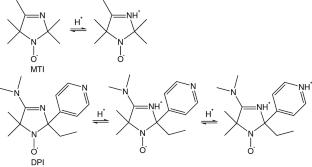pH of Water Intercalated into Graphite Oxide as Determined by EPR Spectroscopy
IF 1.1
4区 物理与天体物理
Q4 PHYSICS, ATOMIC, MOLECULAR & CHEMICAL
引用次数: 1
Abstract
Two pH-sensitive spin probes 4-(methylamino)-2-ethyl-5,5-dimethyl-4-pyridine-2-yl-2,5-dihydro-1H-imidazol-1-oxyl (DPI, also known as MEP) and 2,2,3,5,5-pentamethyl-2,5-dihydro-1H-imidazol-1-oxyl (MTI) were used to measure pH of water intercalated in Brodie graphite oxide. The pH value was found to be 2.25 ± 0.05 immediately after adding water to graphite oxide and decreased to 1.75 ± 0.05 during ca. 30 h.

EPR光谱法测定氧化石墨插层水的pH值
采用4-(甲氨基)-2-乙基-5,5-二甲基-4-吡啶-2-基-2,5-二氢- 1h -咪唑-1-氧基(DPI,又称MEP)和2,2,3,5,5-五甲基-2,5-二氢- 1h -咪唑-1-氧基(MTI)两种pH敏感自旋探针测量了插入Brodie氧化石墨中的水的pH值。在氧化石墨中加水后,pH值立即为2.25±0.05,约30 h后,pH值降至1.75±0.05。
本文章由计算机程序翻译,如有差异,请以英文原文为准。
求助全文
约1分钟内获得全文
求助全文
来源期刊

Applied Magnetic Resonance
物理-光谱学
CiteScore
1.90
自引率
10.00%
发文量
59
审稿时长
2.3 months
期刊介绍:
Applied Magnetic Resonance provides an international forum for the application of magnetic resonance in physics, chemistry, biology, medicine, geochemistry, ecology, engineering, and related fields.
The contents include articles with a strong emphasis on new applications, and on new experimental methods. Additional features include book reviews and Letters to the Editor.
 求助内容:
求助内容: 应助结果提醒方式:
应助结果提醒方式:


